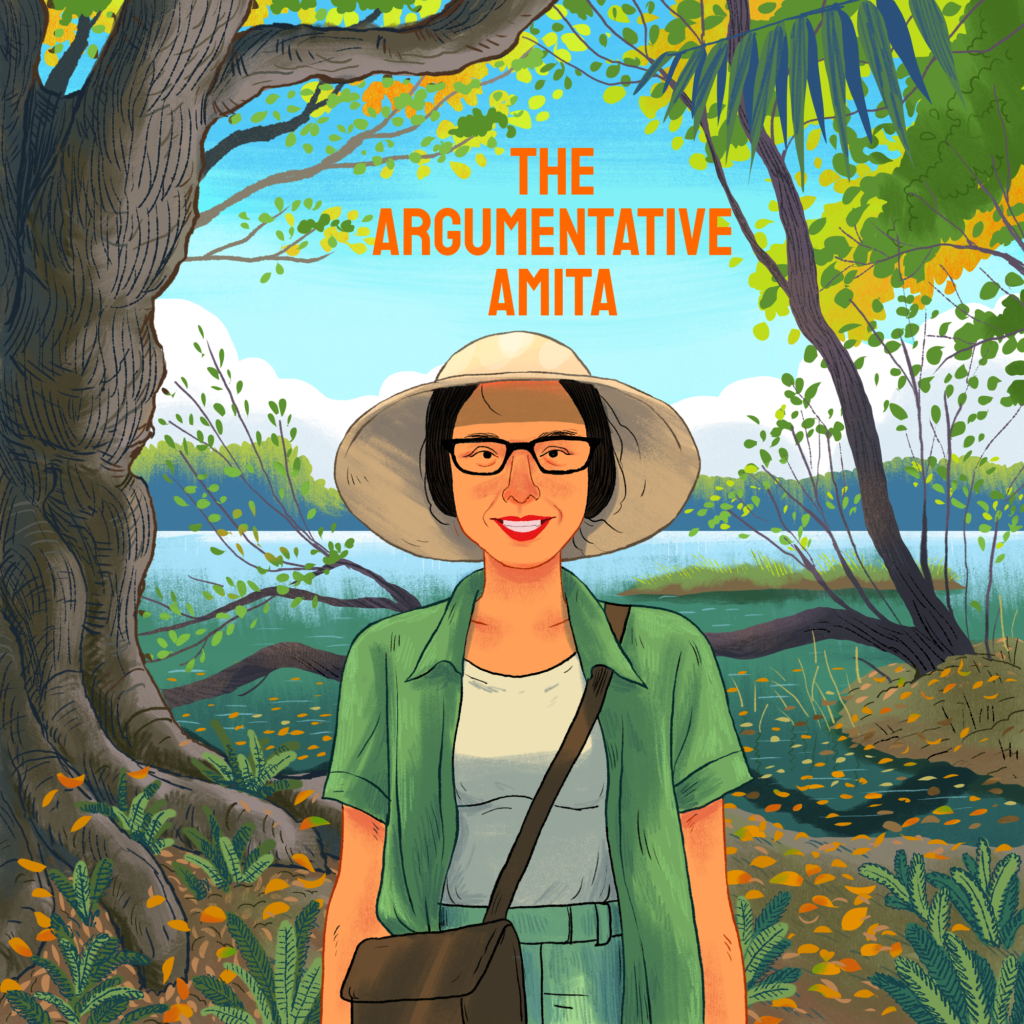
| Amita Basu | The Argumentative Amita | Article No 2 |
(This is the second column in The Argumentative Amita series.)
It’s become a truism that in the 21st century, the human brain faces problems very different from the ones it evolved to deal with. For instance, the calorie-poor environments we evolved in, where starvation was a perpetual threat, led to our developing the instinct to stuff ourselves with high-sugar, high-fat, high-salt foods whenever possible. This instinct is counterproductive today, when, for most readers of this blog, obesity is a far bigger threat than starvation. Behavioral scientists call problems unsuited to our evolved instincts and capacities ‘wicked problems’ – problems designed seemingly, wickedly, to defeat our cognitive capacities. No problem is more wicked than climate change.
Wicked problems (Rittel & Weber, 1973) have the following features:
- Wicked problems are ill-defined, with no stopping rule. A ‘well-defined problem’ is one with a clear solution. For a well-defined problem, therefore, it’s clear when the problem has been successfully solved and we can stop working on it. “2+2” is a well-defined problem. “Success in life” is an ill-defined problem. With climate change, we’ll never be quite certain when the problem has been solved. Maybe when we’ve limited the rise in global mean annual temperatures from pre-industrial levels to less than 1.5°C. But what if the scientists’ models are wrong – what if this cutoff proves too high, and some of the worst possible outcomes materialise anyway? It’s tough to know when the problem of climate change can be considered solved.
- In a wicked problem, every problem feature is a symptom of another. The rise in global mean annual temperatures is only a symptom of the problem; so is the rising frequency and intensity of extreme weather events. The real cause of climate change is rising concentrations of greenhouse gases (GHGs). A wicked problem like climate change presents as a set of interlinked features, where it’s not clear what’s cause, what’s effect, what’s symptom – where, therefore, our problem-solving focus gets sidelined by distractions. Another problem: ‘global mean annual temperature’ is an abstraction. What we as individuals experience is much more concrete: actual day-to-day temperatures at some specific location on earth. What we remember is a trend based on this information, which we’ve selectively attended, forgotten, and distorted. Rising concentrations of GHGs are undetectable to human senses. Average temperatures are rising too slowly for our sense organs to detect them (which is why we must rely on historical data). So, if someone has not directly experienced a disastrous weather event (or has attributed it to ‘Shit happens’), or if we as individuals are profiting from the changing climate (if, for instance, we’re farmers in temperate latitudes, where rising temperatures have extended the growing season and crop yields), then it can feel like an act of faith to take scientists at their word, and to believe that climate change is real, ubiquitous, and urgent.
- Every wicked problem is unique, with no margin for error in the solution: Climate change is an existential problem: we only get one chance to solve it, and we’ve got to get it right. In one sense, then, climate change is like the major problems that we all face as individuals. Think about the biggest problems of our own lives: choosing a career, choosing a life partner, raising our children. Most of us expect to make these big decisions only once, and we know that, if we get it wrong, the consequences are enormous. The paradox is that we get far more practice making every day, inconsequential decisions: ordering lunch, assembling an outfit, planning the weekend. It’s the problems that matter most that we get least practice solving. It’s the biggest problems at which we’re the least skilled as problem-solvers. Climate change is like choosing a spouse – except that the stakes are billions of times bigger. Is it any wonder that we feel daunted in the face of such a one-off, do-or-die problem?
- Wicked problems often feature a diffusion of responsibility: Natural resources like biodiversity, clean air, fresh water, and stable climate are ‘commons’ – goods and services that we all enjoy in common, as distinct from private property. When a factory releases its sewage into a river, it enjoys all the benefits of free waste disposal, but the penalties of water pollution are distributed over everyone in the river’s catchment area. Meanwhile, the efforts of citizens to clean up their river benefit everyone equally, not just those making the effort. This diffusion of responsibility, and this asymmetry in the distribution of effects of positive vs. negative individual actions, creates the ‘tragedy of the commons,’ whereby goods held in common are the likeliest to be degraded by abuse. For any public good, individuals are incentivised, by the nature of the ‘game,’ to act selfishly and for the short term, to maximise their own harvests of common resources, to leave someone else to clean up after them. This situation is tailormade to engender apathy about the fate of public goods.
What can we do in the face of the wicked problem of climate change?
First, we must recognise that it’s not us – it’s the nature of the beast. Wicked problems seem designed by a malicious fate to defy our better instincts, to make selfish modes of behaving the path of least resistance – riding our cars rather than the metro, eating steaks rather than tofu. Climate change is a hard problem for all of us.
Once we’ve acknowledged this, it becomes a little easier to take action. First, we have to acknowledge that it’s not too late. We can still act, and how we act does still matter. When we feel a little less overwhelmed, we can begin to take individual action, and to unite to demand systemic change. Once we’ve overcome our guilt, we can take real responsibility, to look the problem in the face, and to act.
Community is key: from my own experience, feeling like you’re the only one who cares is plain wrong; feeling like you’re the only one fighting the dark beast of this wicked problem is soul-crushing. So don’t fret alone, don’t fight alone. Talk to people who care. Then band with them to do something small, local, concrete. Clean up your local lake. Plant indigenous flora in your garden or on your balcony. Eschew the latest fashion and buy durable, well made clothes that you know you’ll wear for decades. Repair, exchange, or donate your clothes, shoes, and electronics.
Human beings evolved to solve problems far more simple, short-term, and concrete than climate change. We evolved to catch prey, avoid predators and disease, and stop toddlers from playing with snakes. The problem we face as a species today requires levels of cognition, creativity, and collaboration far beyond anything we’ve managed before.
Climate change isn’t the kind of problem we evolved to solve. On the face of it, it doesn’t seem like a problem we can solve. But if humankind’s 200,000-year history on earth proves anything, it proves that we excel at defying our own ideas about what’s possible, uniting to wage war against wickedness in any form, and soaring over the thunderclouds into the sun of our own better instincts.
END
Next steps:
Join with other citizens to fight for your local environment.
Move towards a sustainable diet: plant-based, local, seasonal, low in processed and packaged foods.
Eschew fast fashion. Repeat outfits proudly, like your favourite celebrities. Support sustainable clothing brands, but, above all, look after your clothes. Good clothes are clothes that last. My sexagenarian mother still has saris that her mother wore – and they’re as good as new. Say goodbye to washing your clothes after every wear and doing laundry in hot water.
_________________________

Amita Basu, is the Columnist and Interviews Editor of MeanPepperVine. She loves Captain Planet, barefoot running, and George Eliot. If dozing in the sun all day were a viable career, she’d be a world-champion sunbather. Her superpowers are befriending any dog on earth, whistling tunefully (while being totally unable to sing), and combining five bright colours in one outfit. Five is the limit, though.
_________________________